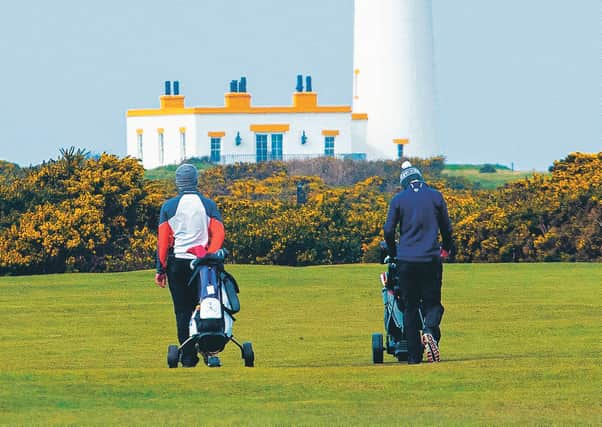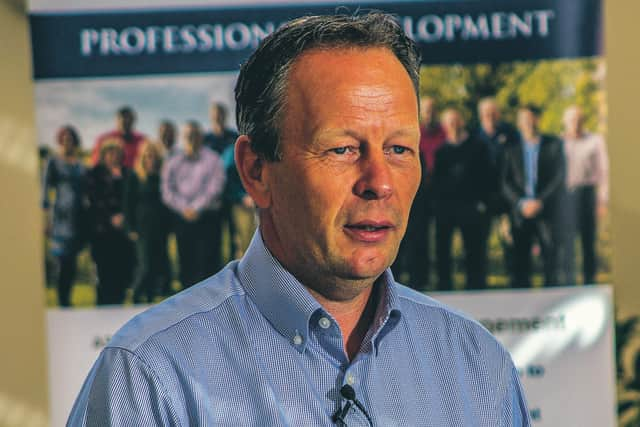Golf’s new reality: more expensive rounds, nine holes, no food and drink, mothballing the pro shop


More expensive golf and some clubs taking radical measures such as dropping from 18 to nine holes, not having a food and drink provision or mothballing the pro shop. That is what could be in store for the sport in Scotland as it starts to try to recover from the coronavirus crisis, according to one of the leading figures in golf club management in Europe.
While the Covid-19 pandemic has closed courses in Scotland and the rest of the UK en masse for the first time since the Second World War, Kevin Fish says it’s not the first time that clubs have been faced with a financial hit in recent years and reckons it is time that action is taken to try and make them stronger for the future.
Advertisement
Hide AdAdvertisement
Hide Ad“This isn’t a once-in-a-century challenge to clubs,” said Fish, a former UK Club Manager of the Year who now runs his own consultancy and recruitment company, Contemporary Club Leadership. “Serious challenges to revenue come around every five years now – we’ve had 9/11, we’ve had foot and mouth, we’ve had the 2008 recession and now we’ve had this – and frankly clubs are not looking after themselves well enough to withstand these 21st century challenges. They need to be investing more into their future survival, including putting more money into reserves, and clubs need to fully understand that the cash only comes from one of two customers – members or visitors.”


While a couple of clubs in Ireland have already announced they will not be reopening on 18 May, the date given for the green light in the Republic, it remains to be seen if something similar will happen in Scotland. A number of clubs, including Eastwood on the outskirts of Glasgow, Lothianburn and Torphin Hill in Edinburgh, Brunston Castle in Ayrshire and Mount Ellen in Lanarkshire, have shut down in recent years, with several others teetering on the brink due to dwindling memberships.
“Yes, it is inevitable,” said Fish, who lives in North Berwick, where he spent nine years as club manager at the Glen before working for Scottish Golf for seven years, in reply to being asked if he felt this crisis would be a bridge too far for some clubs. “There is an over provision of golf, because of the large increase in the number of golf holes available in the 20 years leading up to the millennium, followed by an equally dramatic 20 per cent decrease in the number of golfers who want to buy a traditional full ordinary membership at our clubs.
“Imagine we were a company selling a product, such as a laptop, and we observed a 20 per cent increase in suppliers entering our market, and a corresponding 20 per cent drop in demand from customers for our product, what would happen? We either have to be the best product on the market, or diversify the product we offer, or risk going out of business. So why haven’t we seen the major market correction you would see in any other industry? The reason for that is the way our clubs are run – club governance. Clubs are run by volunteers with genuinely great intentions and no club captain wants the club to go under on his or her watch.
“I can tell you from our CCL barometer analysis of over 100 club accounts that the state of the industry going into this crisis was not particularly healthy and coming out golf is going to be under even greater pressure. Tim Brooke-Taylor [the English comedian who was best known for being part of The Goodies] died a couple of weeks ago and they reported he didn’t die of Covid, he died with Covid. This will sadly happen to some clubs. They may die with this problem, but they won’t die as a result of it.”
It’s a stark assessment and Fish must now lead clubs through this challenge. “We are back to club governance again – the elected committees at clubs must stand up and be counted, and if they believe there is demand for golf in their town then they must take decisions that secure the club’s future.
“They must stop thinking that the government or national governing bodies owe them a handout that at best will kick the can down the road to the next committee that takes over from them.
“The governance model in place at private clubs isn’t copied by big businesses for good reason – rarely do you find a company where the owners and decision makers are also the customers, and for that reason I often find committees would rather talk about the sand in the bunkers and the cost of the coffee refills than the crucial matter of raising membership revenue as part of a long-term strategic plan.
Advertisement
Hide AdAdvertisement
Hide Ad“Spare a thought for the managers at clubs, too. Providing their employers with the unvarnished truth doesn’t often meet with a pay rise for their insight and leadership.
“It’s a shame it took this crisis to make people realise that the most important thing they can do is to look after their members and make them feel like they belong. The lockdown has certainly shown people how much they are missing the extended family that they have at the golf club. The key now is to show people that they really can’t live without their membership of the local club. As I learned from Duncan Bannatyne [the Scottish entrepreneur and philanthropist] in 2008 we don’t see people give up their broadband subscription – because they realise that they can’t live without it. Do members feel that way about their local club?
“Ultimately, when clubs ring me, they say this is great insight Kevin, but what do we do next? Now is the time for clarity of thinking, and in an industry where everyone has an opinion it is essential that the club committee is united behind a single objective that the members can support. I can narrow it down to one of three things they can do: survival, consolidation or development.
“For those for whom survival is the only option, this could mean a return to running all club administration with volunteers, reducing course cutting frequency, dropping from 18 to nine holes, not having a food and beverage provision or mothballing the pro shop. Drastic but perhaps essential measures to ensure there is still golf in your town in ten years’ time.
“For others they may secure the support of their members to trade their way more aggressively through the challenges ahead, which will need a more business-like approach to running their affairs, where decisions are based on the best data and insight available, not emotion.”
Fish has conducted two polls among clubs since the crisis struck, the first focusing on the immediate response to the shutdown and the second looking at beyond the closure of courses, with still no word of when courses in the UK will be allowed to reopen.
“Almost half of clubs surveyed now believe that they will see an increase in resignations this year, and for those on the wrong side of that news, the anticipated resignation rate is typically 11 per cent – almost double the typical annual rate.
“I have encouraged club managers and their committees to remind their members that they are far more than just customers, they are owners, shareholders and custodians of their club, and if they want their community, their town and their children to enjoy the same benefits they have enjoyed, members have to do whatever it takes to see their club through this period in the club’s history.”
A message from the Editor:
Advertisement
Hide AdAdvertisement
Hide AdThank you for reading this story on our website. While I have your attention, I also have an important request to make of you.
With the coronavirus lockdown having a major impact on many of our advertisers - and consequently the revenue we receive - we are more reliant than ever on you taking out a digital subscription.
Subscribe to scotsman.com and enjoy unlimited access to Scottish news and information online and on our app. With a digital subscription, you can read more than 5 articles, see fewer ads, enjoy faster load times, and get access to exclusive newsletters and content. Visit https://www.scotsman.com/subscriptions now to sign up.
Our journalism costs money and we rely on advertising, print and digital revenues to help to support them. By supporting us, we are able to support you in providing trusted, fact-checked content for this website.
Joy Yates
Editorial Director
Comments
Want to join the conversation? Please or to comment on this article.
